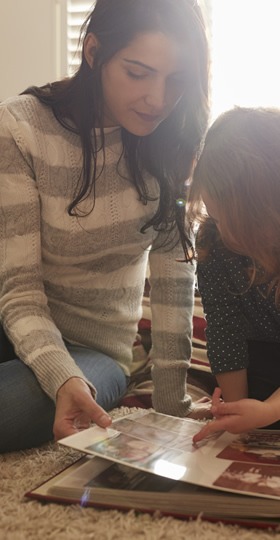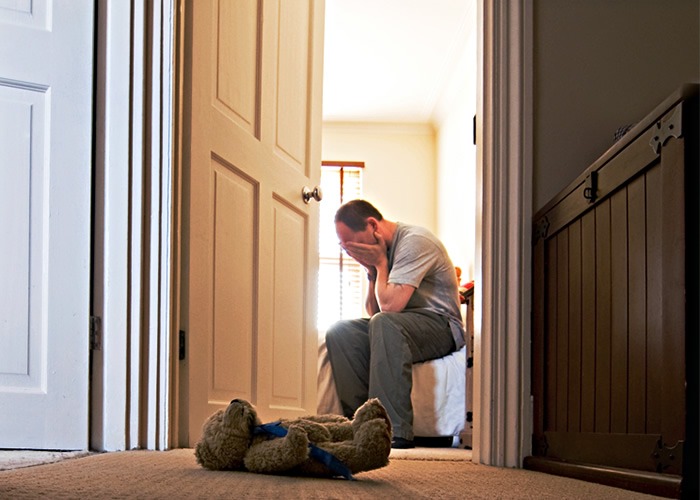Coping with the Death of a Child
The death of my child was undoubtedly the most difficult and painful experience that I have ever lived through. My life was shattered the moment I found out that my child had died. Nothing in the world could have prepared me for such a devastating loss. My child made every day shine. The smile, the eyes, the scent of my child, are a part of every fiber of my being.
All of my dreams, hopes, and future plans involved parenting my child. It has been a long and painful journey to come to a place of acceptance and at many points along the way, I did not think I would get there.
I needed to relearn how to survive each day even when I did not feel that I wanted too. Some days I felt like I had moved forward in my grief and other days that I had slid backwards.
Remembering the early days after the death fills me with overwhelming feelings of sadness, loss and a sense of unfairness. If only I had had someone to confide in, who had suffered a similar loss and who could have understood my pain, someone who could untangle the feelings that I was going through, explain what was ahead, someone to help me make sense of something that did not make sense at all.

As a newly bereaved parent, you have experienced a most devastating life event. It is my hope that the sharing of my passage through grief will provide you with an understanding, solace, and insight into the multitude of feelings that you may have already begun to endure.
Your courage in taking the opportunity to read this information is a testament to your ability and internal strength to move forward in your journey through grief.
The Early Stages
When they told me that my child had died I felt as if my world suddenly stood still, and I was filled with an overwhelming sense of shock and disbelief. The shock that I was experiencing enabled me to carry on through the death and the funeral ritual. I was going through the motions but felt ever so alone and empty inside. Other times I felt that maybe there had been a mistake. Maybe all of this was a nightmare and someone would wake me up. It was just too horrible to be real.
For the first time in your life, you may experience a multitude of feelings and emotions that you have not felt before – feelings such as shock, disbelief, denial, anger, and panic among a host of other emotions that you may find difficult to put into words. You may experience all or a combination of these feelings, as all are natural emotions of grieving. You may describe yourself being on an “emotional roller coaster.” Your emotions may be unpredictable – sometimes you may feel “fine”, and at other times you may only be able to mask the pain and “get through” daily life. Occasionally, you might feel overwhelmed by a flood of intense emotions that may be triggered by many different events that remind you of your child. The strength and unpredictable nature of your feelings may not only be frightening for you and for your loved ones, but also very painful. At this early stage in your grief, it might seem that little that you do is able to take away the profound feelings of sadness and loss.

Other feelings of confusion, disorientation, disorganization, and fear might also arise. You may find that you have experienced difficulty concentrating or remembering. These are common reactions and, in time, these abilities will return.
Anger is also a natural and normal reaction to the unfairness of your child’s death. Expressing your anger may help you release those feelings of anguish and frustration.
Many parents who have had a child die experience feelings of guilt and remorse, and question the “what ifs” and “if onlys” of their child’s death. As parents, it is natural to expect that our children will outlive us. When this reality is not so, it may fundamentally change how we view the world around us. You may have feelings of helplessness because you were unable to prevent your child’s death, and also because the concept of choice was removed from your control.
The emotions of grief are an essential part of the healing process. By not blocking these feelings, your passage through grief will begin.
Your Grief is Unique
Through encountering other parents who have had a child die, I have learned that my grief journey is unique to me. It has been tempered by my own special memories, experiences and love for my child. I allowed myself to feel the emotions that came naturally and did not follow any path other than my own.
 How one grieves is truly a unique journey based on our past experiences, including cultural and spiritual beliefs, our relationships with our children and the world itself. There is no timetable or “right” way to grieve. As a bereaved parent, you have the right to think, feel and express your grief, and no one, regardless of their “good intentions”, has the right to minimize your feelings or tell you how you “should” be feeling.
How one grieves is truly a unique journey based on our past experiences, including cultural and spiritual beliefs, our relationships with our children and the world itself. There is no timetable or “right” way to grieve. As a bereaved parent, you have the right to think, feel and express your grief, and no one, regardless of their “good intentions”, has the right to minimize your feelings or tell you how you “should” be feeling.
The Grief Journey
Some days all I want to do is sleep and forget everything that happened. Other days I cannot sleep or eat or even begin to think about what needs to be done. I feel so lost and cut off from reality. Some days I make myself so busy that I do not have to think, and other days it takes every ounce of energy to start my day.
Many bereaved people will state that grieving the death of a child is the most difficult mourning of all. Nothing makes any sense or fits anymore. The intensity of these emotions may affect how you feel physically and emotionally. Fatigue, sleeplessness, loss of appetite or restlessness are all common reactions to grief.
You may go over events repeatedly in your head. This can happen at any time of the day or night. You might have difficulty sleeping because of various images, or you may want to sleep all the time in order to try to avoid them.
Although there is no set answer for how long you will feel this way, try to take each day one day at a time. Try to do one good thing for yourself each day that you found enjoyable and peaceful before your child died. Listen to your body and rest when you need to. Eat balanced meals. Lower your expectations and defenses for a while and rely on the support and help of others. Try to accept your limitations during this difficult moment in time. Only you know yourself well enough to do whatever you need to do to deal with the intense feelings of grief. Have confidence that, in time, you will return to the activities of daily living that you participated in before your child’s death.
Reaching Out
Friends and family have tried to be there for me but at times they would do or say things that would upset me further. I chose to ignore their “I think you should” comments and in time realized who provided me with the most comfort. I could simply be myself with them whether I was having a good day or not.

Your family and friends will try to comfort you in ways that you do not always choose to accept. They need to know what they can do to help you. Try to tell people what your needs and wishes are. These requests will let them know how they may help you in a specific way. The warmth and support of comforting friends and family is a precious gift. With such close supports you do not have to walk the grief journey alone.
Talking About my Child
My friends and family would rarely mention anything about my child for fear of upsetting me. I eventually told them that it helped me to talk openly about my feelings and the life of my child. The memories of my child will always be a part of my heart. These memories bring not only tears from sadness but also tears from the joy that I received in our life together.
By relating memories and stories of your child with others that listen in a caring and nonjudgmental manner, you are sharing your feelings. Not only might this be of benefit to you, but it also gives permission to those around you to discuss your child’s life as well as their death.
 In time you may decide to celebrate the life of your child through writing a poem or book, planting a perennial garden or tree, building a bench overlooking a favorite place or helping others through their grief.
In time you may decide to celebrate the life of your child through writing a poem or book, planting a perennial garden or tree, building a bench overlooking a favorite place or helping others through their grief.
Cherished Memories
When I go into my child’s room I feel as if my child is still there. The memories feel very real as do my intense emotions. What am I going to do with all of my child’s belongings?
Items and belongings that remind you of your child may initially be very painful, but in time you may want to keep them. There is no time frame for grieving. When you are ready, only you will know what you would like to do with these items. Having objects to touch, hold and smell is a lasting part of your special relationship with your child. Many bereaved parents create memory boxes in which they keep their cherished belongings, keepsakes, and photos.
Holidays and Anniversaries
How will I ever be able to celebrate the holidays without my child? Everything about the holidays reminds me of my child. It is such a special time for children.
Holidays and special occasions are extremely difficult times for a bereaved parent. Dealing with past memories will open a floodgate of emotions and, at this time, the reality of your loss may become even more painful. You may encounter expectations from others as well as from yourself. You are the expert of your own life and your own grief – do what you feel is right for you. Let others know that the holidays may be an exceptionally difficult time for you. When loved ones ask you for commitments, suggest that you will join in the festivities if you feel that you are able to that day.
Making Sense of It All
I have learned not only to survive but also to accept that I will not be the same as before my child’s death. I have learned to once again find pleasure in small comforts, to smile and to laugh. My friendships and family have become precious oases of comfort. Most importantly, my child is always a part of me in my head and my heart.

As a newly bereaved parent, your life will not be the same again. The person who coined the phrase “time heals” could not possibly have lived through the devastation of the death of a child. Time will not take away your memories of your life together, or the love that you shared, or the fact that you wish that things could be different. Time will, however, allow you to move through the intense emotional pain of grief, and time will move you forward in your search to find meaning. Time does allow you to redefine the magnitude of your loss and move you forward in your search to make sense of something that, at this moment, does not make sense at all. Understand that the search to find meaning after a devastating loss is a natural and healthy part of the grief journey.
It takes courage, inner strength and the love of family and friends and the special memories of your child to journey through grief and into healing. Have faith in yourself that, in time, you will move through your devastating loss…

